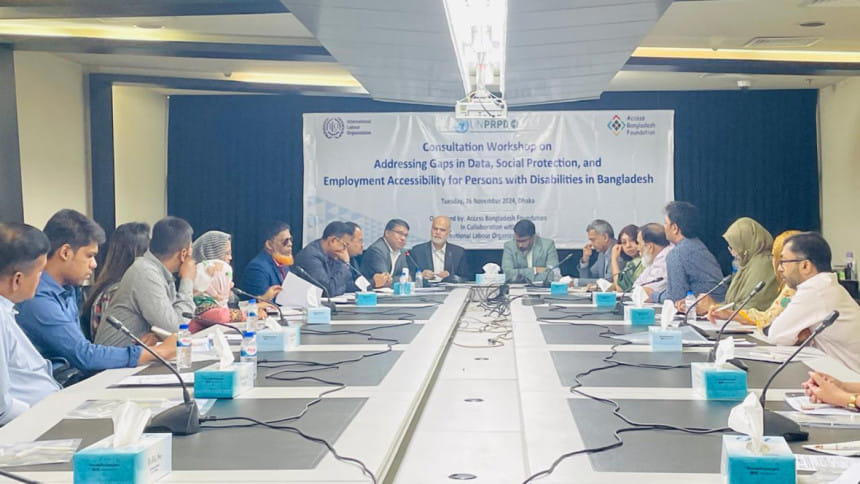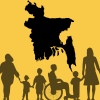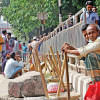Study finds significant gaps in disability-related data

Access Bangladesh Foundation, in collaboration with the International Labour Organization (ILO), organized a consultation workshop on November 26 at The Daily Star Centre, Dhaka.
The workshop presented key study findings and gaps in data systems, social protection, employment opportunities, and policy implementation for persons with disabilities. It also sought to gather feedback from multi-stakeholders to shape actionable recommendations. The event's outcomes aim to influence policymakers to enhance inclusive data systems, expand social protection, and improve employment opportunities for persons with disabilities.
The study, titled "Persons with Disabilities in Bangladesh: Addressing Gaps in Data, Social Protection, and Employment Accessibility," was conducted by Research and Policy Integration for Development (RAPID) with support from the UNPRPD Programme of ILO. Dr. M. A. Razzaque, Chairman of RAPID, presented the keynote, while Albert Mollah, Co-Founder and Executive Director of Access Bangladesh Foundation, moderated the event.
In total 35 participants from persons with disabilities including women and job seekers with disabilities and representatives from government, NGOs, UN bodies, CSOs,OPDs participated in this workshop.
In his welcome remarks, Syed Saad Hussain Gilani, Chief Technical Advisor at ILO Country Office Dhaka, underscored the importance of creating decent work opportunities for persons with disabilities. He emphasized the critical role of disaggregated data in inclusive development and policy design.
Key Findings
Dr. Razzaque highlighted significant gaps in disability-related data, noting inconsistencies in classification criteria, measurement tools, and data collection processes. While 3.4 million persons with disabilities receive a monthly allowance of BDT 850, over 6 million remain excluded, contributing to higher poverty rates among households with disabilities. He recognized the lifecycle approach outlined in the National Social Security Strategy but stressed the need to expand its scope to include more persons with disabilities.
In the employment sector, only 0.75 million persons with disabilities are employed (Labour Force Survey 2022). Challenges such as workplace inaccessibility, skills mismatches, slow implementation of quotas, and pervasive discrimination, particularly for women and those with severe disabilities, hinder their integration into the labor market.
Policy Recommendations
- The workshop proposed the following measures to address the challenges:
- Establish a robust and credible database for inclusive policymaking
- Expand and enhance social protection coverage for persons with disabilities
- Make the mainstreaming social protection schemes inclusive
- Initiate allowances for caregivers of severe nature of disabilities
- Increase budgetary allocation in inclusive health, rehabilitation and education
- Create more employment opportunities and foster economic inclusion
- Raise awareness and implement capacity-building initiatives to promote rights and improve service delivery
- Recognize the heightened vulnerabilities of persons with disabilities during crises
- Strengthen policies and institutional mechanisms to address systemic barriers
In the speech, the Chief Guest, Md. Azmul Haque, Joint Secretary and Director (Development, Planning, and ICT) of JPUF, emphasized the importance of integrating persons with disabilities into mainstream development rather than relying solely on specialized programs. He called for reforms that address their needs effectively.
Farjana Reza, National Programme Officer at ILO, highlighted the UNPRPD Programme's success in engaging diverse stakeholders, including OPDs, NGOs, CSOs, private sectors, TVET institutes, and government agencies, to strengthen systems for disaggregated data, social protection, and employment.
Albert Mollah acknowledged the broad scope of current social protection schemes but noted their limited accessibility for persons with disabilities, which exacerbates marginalization. He urged the government to increase targeted social protection measures for severe nature of disabilities and ensure the meaningful participation of persons with disabilities, OPDs, and CSOs in policy reforms and development processes.
This workshop underscored the urgency of inclusive policymaking and collective efforts to address the needs of persons with disabilities, ensuring their meaningful participation in society and national development.

 For all latest news, follow The Daily Star's Google News channel.
For all latest news, follow The Daily Star's Google News channel. 








Comments